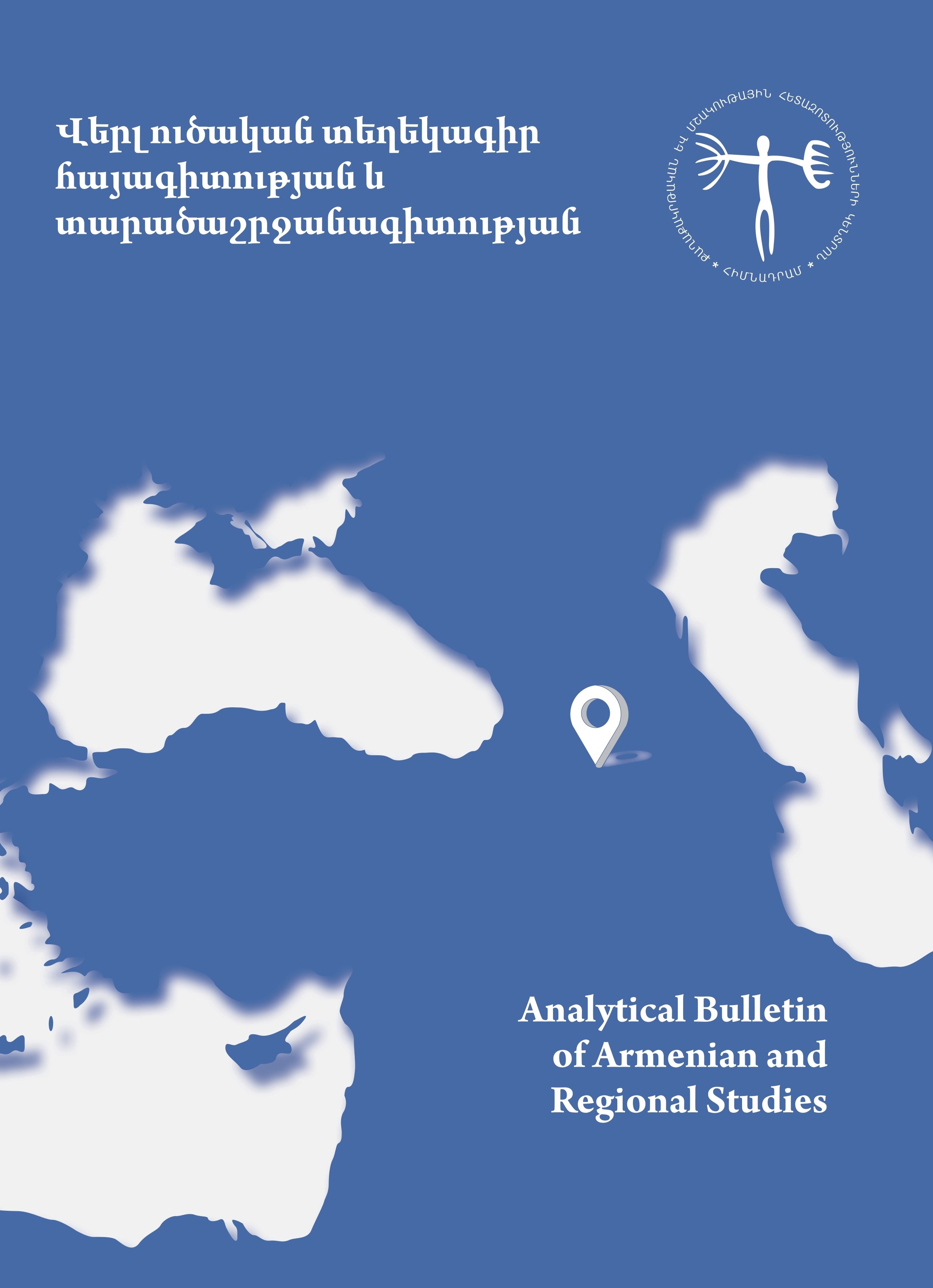Roam Sweet Home? A Minor Fieldwork Study on the Identity Constructions of Diaspora Armenians
DOI:
https://doi.org/10.56673/18294502-sse2024.19.2Keywords:
Diaspora, identity, Sweden, Armenians, belongingAbstract
The study aims to investigate how migrant identities, positionalities, and sense of belonging are informed in the situational interactions with multiple cultures and the local diaspora community in Sweden. Specifically, this study seeks to scrutinize how the identities of diaspora Armenians living in Sweden, with backgrounds in the Middle East, are constantly shaped and reshaped by interactions with different cultures. The aim of the study is best explained by our motivation to see how identities fluctuate and how identity oscillations can affect one’s sense of place and belonging, as well as to understand how our participants narrate and explain the meaning of ‘home․’ Through the personal stories and experiences of the participants, the study aims to deconstruct primordial assumptions about the fixed nature of identities and belonging and analyze the representation of the meaning of diaspora itself in the eyes of the participants.
References
Adam. Interview, 2021.
• Anna. Interview, 2021.
• Arthur. Interview, 2021.
• Arthur, Ella, Andy. Focus Group 2, Interview, 2021.
• Blommaert, Jan, and Jie Dong. Ethnographic Fieldwork: A Beginner’s Guide. Bristol ; Buffalo: Multilingual Matters, 2010.
• Boccagni, Paolo. “From the Multi-Sited to the in-between: Ethnography as a Way of Delving into Migrants’ Transnational Relationships.” International Journal of Social Research Methodology 19, no. 1 (2016): 1–16.
• Brubaker, Rogers. “The ‘diaspora’ Diaspora.” Ethnic and Racial Studies 28, no. 1 (2005): 1–19.
• Calhoun, Craig. “Nationalism and Ethnicity.” Annual Review of Sociology 19, no. 1 (1993): 211–39.
• Campbell, Lisa, M., Noella, J., Gray, Zoe, A., Meletis, James, G., Abbott, and Jennifer, J. Silver. “Gatekeepers and Keymasters: Dynamic Relationships of Access in Geographical Fieldwork.” Geographical Review 96, no. 1 (2006): 97–121.
• Crewe, Ben. “Not Looking Hard Enough: Masculinity, Emotion, and Prison Research.” Qualitative Inquiry 20, no. 4 (April 2014): 392–403. https://doi.org/10.1177/1077800413515829.
• Davies, James, and Dimitrina Spencer, eds. Emotions in the Field: The Psychology and Anthropology of Fieldwork Experience. Stanford, Calif: Stanford University Press, 2010.
• Diphoorn, Tessa. “The Emotionality of Participation: Various Modes of Participation in Ethnographic Fieldwork on Private Policing in Durban, South Africa.” Journal of Contemporary Ethnography 42, no. 2 (April 2013): 201–25. https://doi.org/10.1177/0891241612452140.
• Eklund, Lisa. “Cadres as Gatekeepers – The Art of Opening the Right Doors?” In Research Realities in the Social Sciences: Negotiating Fieldwork Dilemmas, 129–48. Armherst, New York: Columbia University Press, 2020.
• Graham, Mark, and Shahram Khostravi. “Home Is Where You Make It: Repatriation and Diaspora Culture among Iranians in Sweden.” Journal of Refugee Studies 10, no. 2 (1997): 115–33.
• Hall, Stuart, "Cultural Identity and Diaspora.” In Colonial Discourse and Post-Colonial Theory ed by Williams, Patrick, and Laura Chrisman., 222-237. Routledge, 1994.
• Ghassan Hage, “Hating Israel in the Field On Ethnography and Political Emotions,” in Davies, J. and Spencer, D. (eds), Emotions in the Field: The Psychology and Anthropology of Fieldwork Experience. (Stanford: Stanford University Press, 2010), 129-154
• Hastrup, Kirsten. “Emotional Topographies: The Sense of Place in the Far North”.” In Emotions in the Field the Psychology and Anthropology of Fieldwork Experience Ed. James Davies and Dimitrina Spencer, 191–211. Redwood City: Stanford University Press, 2010.
• Huang, Shirlena, Peggy Teo, and Brenda S.A Yeoh. “Diasporic Subjects and Identity Negotiations: Women in and from Asia.” Women’s Studies International Forum 23, no. 4 (2000): 391–98.
• Kitchen Stories. Comedy/Drama. Norway, Sweden, 2003.
• Luhrmann, Tanya. “9. What Counts as Data?” In The Psychology and Anthropology of Fieldwork Experience, edited by James Davies and Dimitrina Spencer, 212–38. Redwood City: Stanford University Press, 2010. https://doi.org/doi:10.1515/9780804774260-012.
• Mason, Jennifer. Qualitative Researching. Third edition., 2018.
• Narayan, Kirin. “How Native Is a ‘Native’ Anthropologist?” American Anthropologist 95, no. 3 (1993): 671–86.
• O’Reilly, Karen. Key Concepts in Ethnography. Sage Key Concepts. Los Angeles (Calif.): Sage, 2009.
• Osman, Fatumo, Abdikerim Mohamed, Georgina Warner, and Anna Sarkadi. “Longing for a Sense of Belonging-Somali Immigrant Adolescents’ Experiences of Their Acculturation Efforts in Sweden.” International Journal of Qualitative Studies on Health and Well-Being 15, no. 2 (2020): 1784532–1784532.
• Said, Edward, Orientalism, London, Penguin Books, 1979
• Spivak, Gayatri Chakravorty. “‘Can the Subaltern Speak?’” In Can the Subaltern Speak?, edited by ROSALIND C. MORRIS, 21–78. Reflections on the History of an Idea. Columbia University Press, 2010. http://www.jstor.org.ezproxy.ub.gu.se/stable/10.7312/morr14384.5.
• Spradley, James P. The Ethnographic Interview. Long Grove, Illinois: Waveland Press, Inc, 2016.
• Suzie, Zaman, Jenna. Focus Group 1, Interview, 2021.
• Volkan, Vamik D. “Transgenerational Transmissions and Chosen Traumas: An Aspect of Large-Group Identity.” Group Analysis 34, no. 1 (2001): 79–97.
• Wästerfors, David. “Observations.” The SAGE Handbook of Qualitative Data Collection, 2018.
Downloads
Published
How to Cite
Issue
Section
License
Copyright (c) 2024 Sona Sukiasyan, Edgar Darbinyan

This work is licensed under a Creative Commons Attribution-NonCommercial 4.0 International License.









